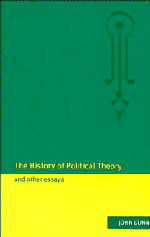Book contents
- Frontmatter
- Contents
- Preface
- Acknowledgements
- 1 Introduction
- 2 The History of Political Theory
- 3 Contractualism
- 4 Political obligation
- 5 Trust
- 6 The claim to freedom of conscience: freedom of speech, freedom of thought, freedom of worship?
- 7 Property justice and common good after socialism
- 8 The dilemma of humanitarian intervention: the executive power of the Law of Nature, after God
- 9 Specifying and understanding racism
- 10 Political science, political theory and policy making in an interdependent world
- 11 Democracy: the politics of making, defending and exemplifying community: Europe 1992
- 12 Is there a contemporary crisis of the nation state?
- 13 Political and economic obstacles to rapid collective learning
- 14 The heritage and future of the European left
- Index
13 - Political and economic obstacles to rapid collective learning
Published online by Cambridge University Press: 05 February 2010
- Frontmatter
- Contents
- Preface
- Acknowledgements
- 1 Introduction
- 2 The History of Political Theory
- 3 Contractualism
- 4 Political obligation
- 5 Trust
- 6 The claim to freedom of conscience: freedom of speech, freedom of thought, freedom of worship?
- 7 Property justice and common good after socialism
- 8 The dilemma of humanitarian intervention: the executive power of the Law of Nature, after God
- 9 Specifying and understanding racism
- 10 Political science, political theory and policy making in an interdependent world
- 11 Democracy: the politics of making, defending and exemplifying community: Europe 1992
- 12 Is there a contemporary crisis of the nation state?
- 13 Political and economic obstacles to rapid collective learning
- 14 The heritage and future of the European left
- Index
Summary
How should human beings respond to the dawning recognition that they may well for some time have been destroying the fundamental conditions of their own existence? This is, paradigmatically, a question which must be explored and thought through carefully together, rather than prejudged and dogmatized about by particular individuals.
In essence., it is an issue of the viable basis for practical cooperation; and it depends upon the existing beliefs and sentiments of immense numbers of human beings, and on the degree to which these can in practice be modified over a reasonably short period of time and by means which may actually prove to be available. At its core, it is an issue of feasibility, human beings being taken as they are (and where and when they are) rather than as we might prefer them to be. What is feasible for us to do to restrain or reverse the damage which we have been doing depends on many different considerations, most of which I am wholly unequipped even to assess for myself. It depends, plainly, on how rapidly and how accurately we can identify the nature of the damage we are inflicting, and on how speedily we can learn the scope and limits of our purely technical capacities to restrain and eventually reverse the harms in question. In both dimensions, there will be an important political component to determining the outcome, simply because of the resource implications of the cultivation of greater vigilance or of more widespread and active inquiry into the relevant causality (chapter 10 above).
- Type
- Chapter
- Information
- The History of Political Theory and Other Essays , pp. 211 - 218Publisher: Cambridge University PressPrint publication year: 1995



